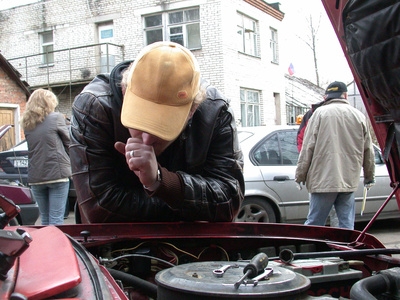
Cars have a difficult time starting or will not start at all if the fuel pump is not working properly. Low fuel pressure can cause engines to start hard, hesitate, misfire, idle roughly and stall. If there is no fuel pressure, the vehicle will either not start or quit running. Low pressure may cause cars with fuel-injected engines to lose power and have trouble accelerating. There are ways, though, to check a fuel pump to see if it is working properly.
Check to see if turning over the engine creates a spark, if the car will not start. Failure to start could be caused by a faulty fuel pump. It could also be caused by a problem with the timing belt or ignition system. To check the spark, connect a spark plug tester to a spark plug wire and try to start the car. This will require two people, one to start the car and another to check for spark. There will be some sparks present if the ignition system is working correctly.
Remove the screws and take off the plastic cover that protects the timing belt. This will allow for a good look at the belt. If the belt turns when the engine is cranked, a lack of compression is probably not the problem. Check to make sure the belt is not loose or damaged. If there are no problems with the compression or ignition, the problem has to be fuel related.
Turn on the ignition and listen for any noises coming from the fuel pump. If the pump does not making any noise, that means it is not running and will need to be fixed.
Use a pressure gauge to check the fuel pressure of the pump. If the pump is running but not working correctly a likely cause is low fuel pressure. The amount of pressure a fuel system requires varies among vehicles, so make sure you know the vehicle's specifications. For most cars and trucks the required pressure will be between 30 and 80 pounds per square inch. Fuel-injected engines can run poorly or fail to start if they are just a few pounds below specifications. Other engines do not need to be as precise.